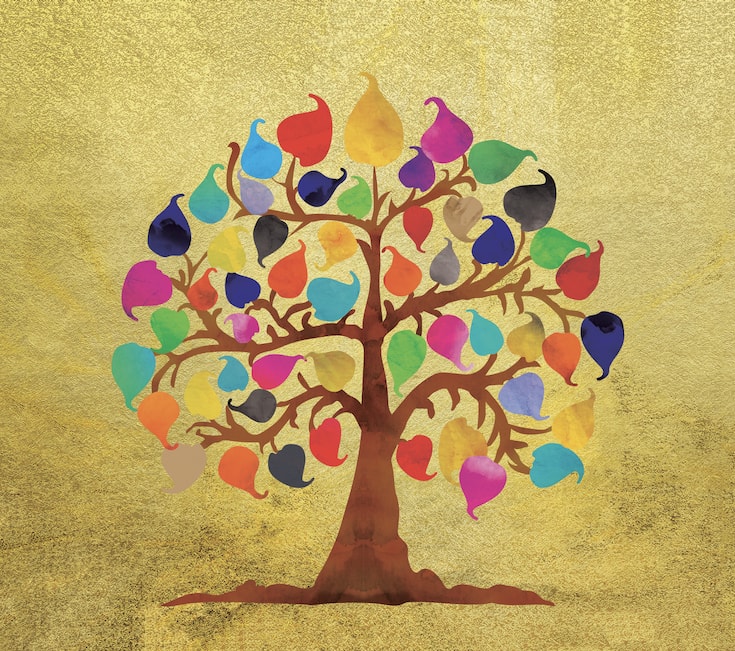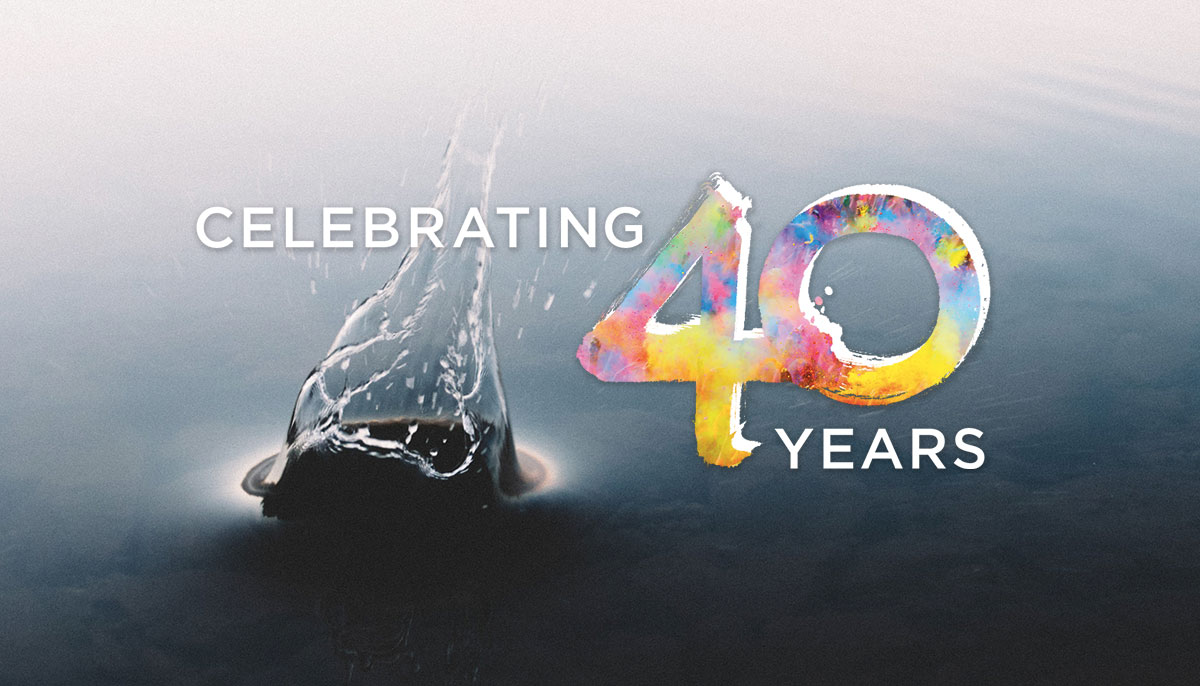2019 marks 40 years of continuous publishing at Lion’s Roar. We’re maturing, and Buddhism in the West is maturing too, but it’s still early days by any standard. We see a landscape rich with diverse voices, traditions, teachings, and practices; societal and individual challenges that are more urgent than ever; and evermore opportunities for Buddhism to have a positive impact.
In our 40th-anniversary year, we’re peering into the future, bringing together some of today’s finest Buddhist thinkers to hear what they think is in store, or should be, for the dharma’s next 40 years.
On this page, you can find all of the introductions and essays from the series. Read, share, and come back throughout the year for thought-provoking perspectives on the future of Buddhism.
What’s the Message?
In our first issue, we asked leading Buddhist teachers (and one astute observer of spiritual America) what they feel is the most helpful message or teaching Buddhism can offer in coming decades. As people who benefit from Buddhist practice, we have a common project: to benefit people’s lives, society, and the future of the earth. This is in fact the common project of all humanity. To it we offer the brilliance of the teachings, the power of the techniques, and whatever wisdom is in our minds and love in our hearts. To be of benefit is the basic Buddhist vow. It is the basic human vow. Let’s talk about how to fulfill it with skill and foresight.
The Importance of Diversity

It’s easy for privileged people to think of diversity as just about appearances—how a company looks, who’s in a community, what groups are represented on stage. People who run things would like us to think of diversity that way, as kind of superficial. Because real diversity challenges power structures and puts us on the spot about who we are as human beings.
This collection of five powerful essays on diversity and Buddhism is part of our year-long series marking the fortieth anniversary of Lion’s Roar. Our theme is the next forty years of Buddhism—how it can change, deepen, and, yes, diversify in order to be of most benefit to many different people’s lives, to our society, and to the future. Benefit, after all, is Buddhism’s only goal and the standard by which it is measured.
Becoming more diverse will be as challenging and transformative for Buddhism as for the rest of society. But while each of these important essays offers a powerful, sometimes damning critique of the Buddhist status quo, each also points to the tremendous progress and benefit that real diversity will bring. It is one of the most important things we can do to make the Buddha’s teachings a reality.
Deepening Our Practice and Study

–>
Buddhists focus a lot these days on spreading the dharma. We aspire to make Buddhist practices and teachings accessible and applicable in order to benefit as many people as possible. And rightly so.
But there is another, less glamorous job that is as important as widening the reach of the dharma. It is deepening the practice and study of Buddhism. That is the subject of these five essays in our fortieth anniversary series looking at key issues for Buddhism’s next forty years.
It is its profundity—the depth of its teachings and practices—that defines Buddhism. Without it, Buddhism is reduced to just another self-help system that, while helpful, only addresses the symptoms of samsara. It is deep practice and study that gives Buddhism its integrity and ensures its benefit in the future.
No matter where we are on our spiritual path, we strive to deepen our own practice and understanding. That’s one contribution we can all make. Beyond that, Buddhism in the West needs a foundation of expert teachers, meditators, and students of the dharma, and so we need to support their long-term practice and study.
That way, Buddhism will be like a great tree—its branches and leaves will spread gloriously because its roots are deep.
Right Activism
I believe modern thought’s greatest contribution to Buddhism is to our understanding of the second noble truth—the causes of suffering.
According to Buddhism, the root cause of suffering is ego, our mistaken belief in a solid, separate, and continuous self, and the three poisons we use to protect it—aggression, attachment, and ignorance. We act selfishly in service to a non-existent self.
This is Buddhism’s essential, life-changing insight. By understandyaking and acting on it, we can reduce, and maybe even end, the suffering of beings. The second noble truth is the diagnosis that leads to the cure, and today our diagnosis is more accurate than ever.
Buddhism traditionally said that the cause of suffering was personal and individual. Now to the personal causes of suffering we have added the psychological and the political.
We understand how suffering and trauma are passed down within families, generation to generation. We work to break the cycle.
We see how ego and the three poisons operate on a vast scale in our political, social, and economic systems. We take action against injustice and work for a more caring society to fulfil our basic vow as Buddhists—to reduce suffering. Buddhists are political because suffering is political.
In this issue, we hear from five Buddhists on the front lines of right activism. Because in the next forty years, there’s no greater challenge facing Buddhism than the challenges facing our world.
A Time of Reformation
Religions aren’t like parents: they don’t get to say, “Do as I say, not as I do.”
Buddhism, like other religions, preaches all kinds of good things—love, wisdom, compassion. But the real teaching isn’t the preaching. It’s how we live. It’s how our communities reflect our values.
There was a time when Buddhists could think their religion was just a bit better than the others. But with Buddhist-led wars and ethnic cleansing, high-profile scandals, and honest analysis of Buddhist communities, we see that Buddhism is too often contaminated with the same chauvanism, abuses, and injustices as the rest of society.
Of course this isn’t surprising. The Buddha taught immaculate, universal realities like the four noble truths and three marks of existence. But as for the rest, Buddhism is a creation of people, and it has always evolved. It is in our hands. That’s why we have such a magnificent opportunity.
As we look ahead to Buddhism’s next forty years, what greater gift can we give to the world than to make Buddhism a model of how to live together with harmony, loving-kindness, wisdom, and justice?
To do that, Buddhism needs to reform and progress, unafraid to look at ourselves honestly and change what needs to be changed. We will benefit, and so will the world.
We won’t achieve perfection in our communities, anymore than any of us will achieve perfection personally. But more and more, step by step, we will be able to say, “Do as we do.”
The Next Generation
Thich Nhat Hanh said that if you want to know the past, look at the present, because everything you see is a product of the past. And if you want to know the future, also look at the present, because the future is being created right now.
As Johnny Edward Dean Jr. says in his essay here, the future of Buddhism is now—you and I are co-creating it through the kind acts and sincere contributions we make today. But the literal truth is also true—the future is in the future. Having just celebrated my sixty-eighth birthday, I know I’m not going to be part of Buddhism’s next forty years (at least not in this body). The future belongs to young Buddhists like the five who share their thoughts, hopes, and ideals here.
I think you’ll be heartened—I know I am—when you read what they have to say. They are thoughtful, engaged, and whole-hearted in their dedication to the well-being of others, qualities I see in so many of their generation. The future of Buddhism—and the world—will be in good hands.
This is the fitting conclusion to our series. The essays, thirty in all, address some of the key challenges and opportunities that will define Buddhism going forward: message, diversity, deep practice and study, reform, and the next generation. Together, they offer an inspiring roadmap for Buddhism’s future.
We have presented this special series to celebrate Lion’s Roar’s first forty years. I hope we have many more years working together with you to benefit people’s lives, our society, and the development of Buddhism. We don’t even have to wait. Our future is now.

